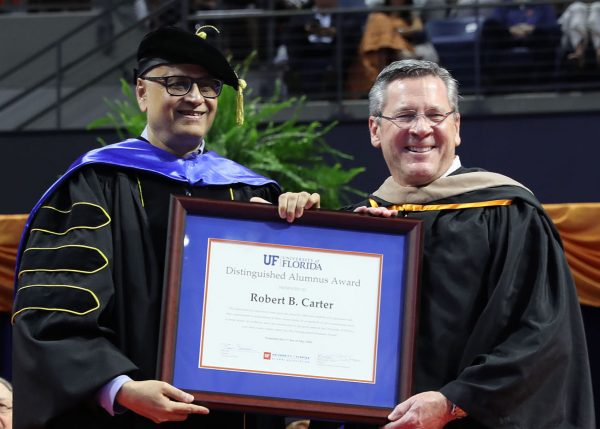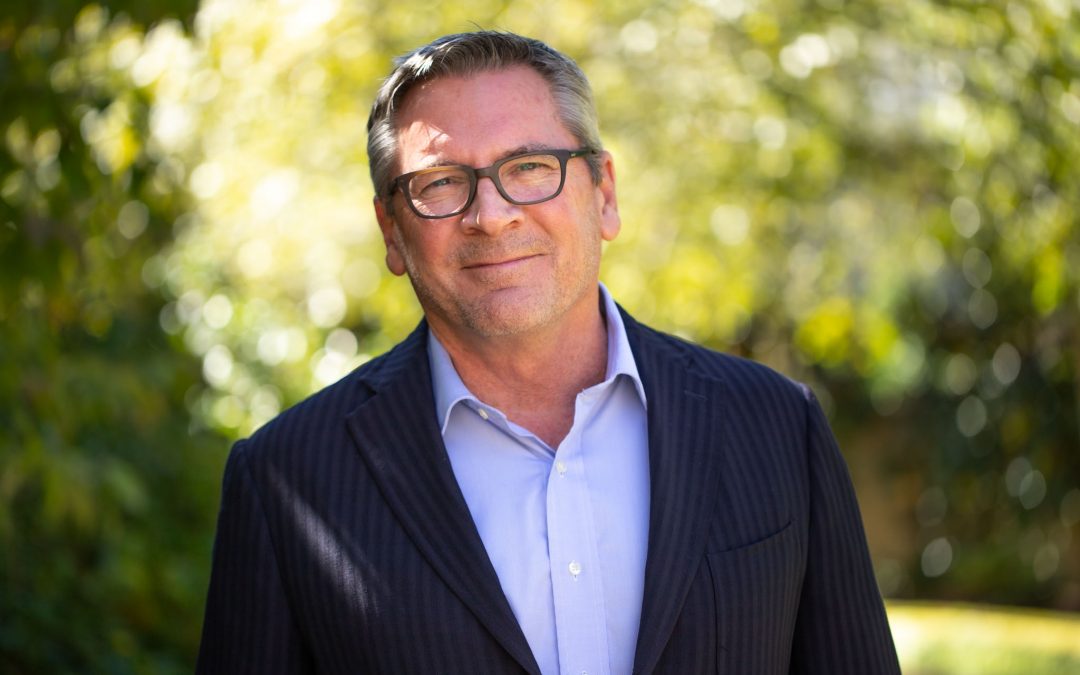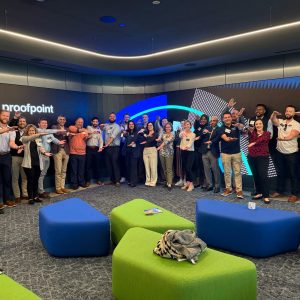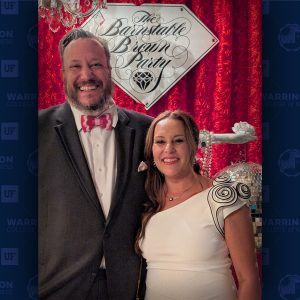Innovation, delivered
FedEx CIO Rob Carter (BSBA ’81) has spent his career innovating business solutions through technology, a passion he first discovered at the University of Florida.
In transit
Early on in his time at the University of Florida, Rob Carter (BSBA ’81) received some devastating feedback. As a pre-med student, he was struggling with the dreaded courses of chemistry and biology. After dropping both classes and meeting with his advisor about his next steps, Carter was offered this comment.
“‘Frankly, Mr. Carter, I don’t think you have what it takes to be successful here at the University of Florida.’ That is a direct quote from my guidance counselor,” he recalled. “That fired me up enough to make some smarter choices at UF.”
Carter’s ‘smarter choice’ ended up being an area he wasn’t very familiar with – computer science.
“I didn’t really have any experience with computers,” he said. “Maybe I had a friend with a Commodore 64…but computers and business seemed interesting to me.”
What started as simple interest grew into a full-fledged passion, especially after Carter took his first computer science class with Dr. Sham Navathe, a renowned researcher and educator in databases.
“[After the first class] I never looked back and have been a tech guy ever since,” Carter said. “It really goes to show what a difference one professor can make. He sparked my interest and changed my life.”
Taking Navathe’s courses and partnering with him on research projects, along with hands-on experience gained while working in the state’s data center on campus, provided Carter with the skillset that employers were looking to hire. After graduating, Carter had a number of job offers, many of which were in the oil industry based in Houston.
Carter didn’t think that Houston was the right fit for him, so he ended up returning to his hometown of Tampa for a role with GTE, the telecommunications company that would become Verizon.
“That choice was destiny for me,” Carter said. “Lots of people ended up losing their jobs in the oil industry because of the ‘80s oil crisis.”
Carter spent about a decade with GTE, during which time he also earned his MBA from the University of South Florida, before getting an out-of-the-blue call from a headhunter asking him to join transportation, ecommerce and business services giant FedEx. While he wasn’t terribly interested in the job at first, the headhunter’s persistence and FedEx’s commitment to innovation would change his mind.
Arrived at destination
Carter joined FedEx in 1993 and moved up the ranks into chief technology officer and later chief information officer, the role he still holds today.
At a time when utilizing technology in business was still ramping up, Carter was on the forefront of change with his seat at the leadership table, which stemmed from a belief of FedEx Founder and Executive Chairman Fred Smith, that “Information about a package is as important as the package itself.”
Over the years, advancements in technology at FedEx have spanned from using autonomous vehicles and robotics to mobility and cloud-based systems, all of which have played a role in the company’s vast growth. Even as technology has continued its rapid evolution, FedEx has been able to keep the pace and integrate innovations into its practices, which is among Carter’s most prized accomplishments.
“We’ve been able to marshal in new waves of technology and computing in order to keep our capabilities current, which has allowed FedEx to grow without being encumbered by legacy technology,” Carter explained.
Carter is taking the same approach with artificial intelligence at FedEx, which he notes is the clear next big advancement in technology, but it comes with significant questions for humanity.
“It’s undeniable that AI is rapidly becoming a powerful tool for almost everything,” he said. “But sociologically, we’ll be wrestling with AI and how it impacts people’s lives and jobs.”
Even with its challenges, Carter chooses to see the positive aspects of using AI across business and society.
“I’ve navigated a lot of trends in compute in 45 years, but not one that seems as boundless as this,” he said. “The world is hyperconnected, and now that compute is capable of handling such large amounts of data, the opportunity to create a better world is boundless.”
Logistics leader

Dean Saby Mitra presenting Rob Carter with the Distinguished Alumnus Award.
Carter’s insights and passion for technology have earned him several accolades throughout his decades with FedEx including Fast Company’s Most Creative People in Business, Fortune Magazine’s Executive Dream Team, Forbes Magazine’s CIO Innovation Award, Information Week’s Chief of the Year Award and membership in CIO Magazine’s CIO Hall of Fame. Most recently, he received the University of Florida’s highest alumni recognition, the Distinguished Alumnus Award.
The secret to his success is straight forward, he believes. Across his nearly 45-year career, Carter has always put advocacy through communicating at the forefront of his work. The self-proclaimed “geek who always volunteered to give presentations” sees this as his way to represent his entire team’s work and serve as their ambassador.
“You can’t gain a whole lot of anything by staying behind the curtain,” he said. “You have to step up and step out, and that didn’t come naturally to me. I was shy and I’m still an introvert, but I enjoy communicating in order to advance our mission and our team’s efforts.”
Advice delivery
Recently, Carter has taken a different step to advancing his team. At the end of June 2024, after 25 years, he plans to retire from his role as CIO. As far as he can tell, he’s among the only individuals to have been in a CIO role for that long.
“FedEx recently turned 50, and there’s a pivot that’s taking place,” he said. “I felt like this was the right time for me to confidently say that the company is in good shape, and it’s time to let the next generation of thinkers take the company to the next level.”
As his time at FedEx is growing short, Carter recently gathered all his officers to impart some final wisdom, which he’d also extend to any young professional.
Carter’s advice can be summarized into the alliterative Q3 (Q cubed), made up of IQ (intelligence quotient), EQ (emotional quotient) and what he calls AQ (adaptability quotient).
“IQ and EQ go hand in hand,” he explained. “You need to be smart, but need to remember that the work we do is with people, so you need to be able to empathize.”
AQ, Carter argues, is becoming the biggest factor in leadership and success. Having a curious mindset, in addition to strong IQ and EQ, are necessary to be an efficient leader.
“It’s easy to get stubborn and think, ‘this is how we do things,’ but that mentality won’t help you get to where you’re going,” he said. “Being intentional about IQ, EQ and AQ will exponentiate your ability to lead.”
Shipping out
Despite nearing the close of this chapter of his life, Carter is looking forward to continuing to bring his insights to the various organizations that he supports. In addition to sitting on the boards of New York Life and the University of Memphis, Carter was recently appointed director of Quest Diagnostics’ board.
With more time on his hands, Carter also plans to do more of his favorite hobbies – cooking, trying new wine, enjoying family time with his five kids and eight grandchildren and outdoor activities. He’s especially fond of spending time on the family farm and rooting himself in nature, so much so that it’s become synonymous with his personality.
“I always wonder if the tech guy or the outdoorsman is my alter ego,” he joked.




